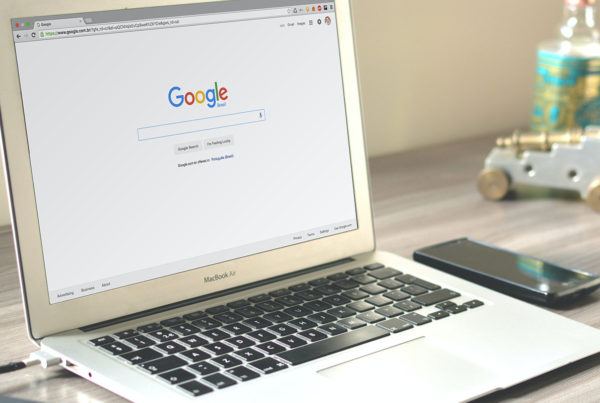Introduction & Terminology
You may have heard of Search Engine Optimization, also referred to as SEO. SEO is a momentous topic, we will break down the components, dispel any myths, and elaborate as to why you need it for your website.
SEO is a set of rules that should be followed by a website owner in order to help the search engine find and rank a website. But first, to make things a bit easier, here are some key terms to understand:
Backlinks:
An incoming link from one web page to your website.
Content:
The information in your website that users encounter. This includes text, images, sound, video and animations.
Keywords:
A word or phrase that is of significance to a search engine
Organic/Natural Search Result:
The websites which come up when you search on a Search Engine (ie. Google, Yahoo) because their content is deemed relevant rather than coming up because the owner of the website has paid for adverts using something like Google Adwords
Page/domain Authority:
Predicts how well a page will rank on search engine based on certain factors.
Traffic:
The number of visitors or views you receive on a web page. Ideally you want more traffic as this means more people are being exposed to your website and what it has to offer.
How SEO works
Search engines work in a similar way to libraries. Google is like the librarian and you (the searcher) are looking for a book. You request a book on topic “X” and the librarian will search through all of the books to find a book deemed most relevant on topic “X” and the next closest books as well. A search engine does the exact same thing.
When you Google something, it scans its database, comprised of all websites, and returns the ones most suited to you. It does this using various algorithms (rules for searching), as well as other factors (such as content and keywords) which you can control through SEO. The better your SEO, the better you will rank and the higher the likelihood that people will find you. SEO incorporates a set of rules, which (when correctly followed) allow for your website to be ranked higher. However, there are some factors which are out of a web developer’s hands. No one can guarantee you first ranking if you are doing it completely organically.
Ranking highly is extremely important, as the first ten results get all the traffic.
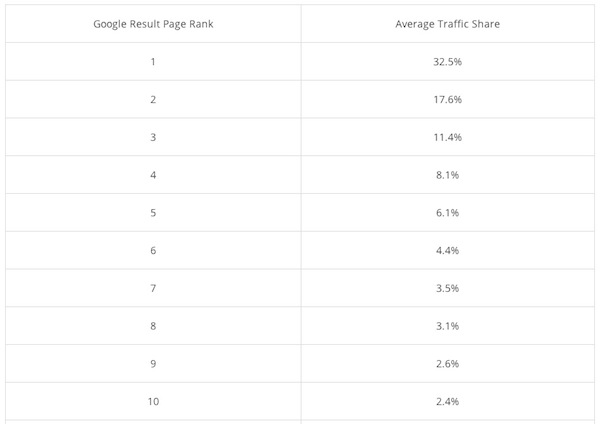
In addition, 91.5% of all traffic comes to and stops at the first page. Therefore, if your website ranks lower than this, you’ll most likely never be found.
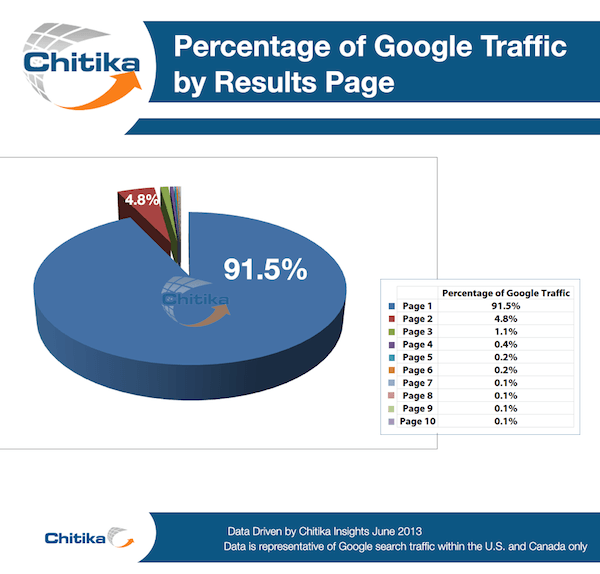
On-site SEO
Onsite SEO are factors which you can alter on your website to influence search engine ranking.
High Quality Content to Get a Good Ranking
This is the single most important factor used to increase traffic through SEO.
The content on your website should be intended for your user and quality is far more important than quantity. Google rewards good, relevant content with higher rankings. There are three important components of good content: Keywords, Header Tags and Image Optimization.
Keywords
Your content must contain relevant words that are frequently searched. In order to get appropriate phrasing you can use the Google Keyword Planner tool.
For example, a web page for the “Foresters Arms” restaurant which is known locally as “Forries” is likely to be searched for as “Forries”. The keyword “Forries” should, therefore, be included in the website to ensure that they are found if either name is searched. It also narrows down the search and increases the chances of being found, as not every Foresters Arms in the world is referred to as Forries.
As you can see “Foresters Arms” got 195 000 results and “Forries” only got 42 600 results.


HTML Markup eg Header tags
The HTML code for your website plays an important role. Using the correct HTML markup and following all the best practices allows search engines to properly understand your content and in turn is rewarded.
For example: Headings (H Tags) give a more general overview of the content and therefore have a higher weighting when Google searches for relevant websites. Therefore, you want to include popular keywords in the headings.
Image Optimisation
Images on your website are also considered content. They should be named appropriately to allow easy identification by search engines. This will further increase your internet presence.
For example, if someone is looking for images for the restaurant “Forestors Arms”. If your pictures are well labelled as numbers or random characters they won’t display.
While search engines are extremely clever, they can’t tell what an image is by just looking at it (yet…), however they are very good at understanding keywords and text. So an image named: DG86FGH.jpg means nothing, whereas Forries-Restaurant-Bar.jpg is very clear.
See: Optimizing Images Web Practical Guide
Google rewards this kind of web design practice, and is often one of the most overlooked factors by people who try to do SEO themselves.
See: Why you should hire a professional web designer instead of doing it yourself
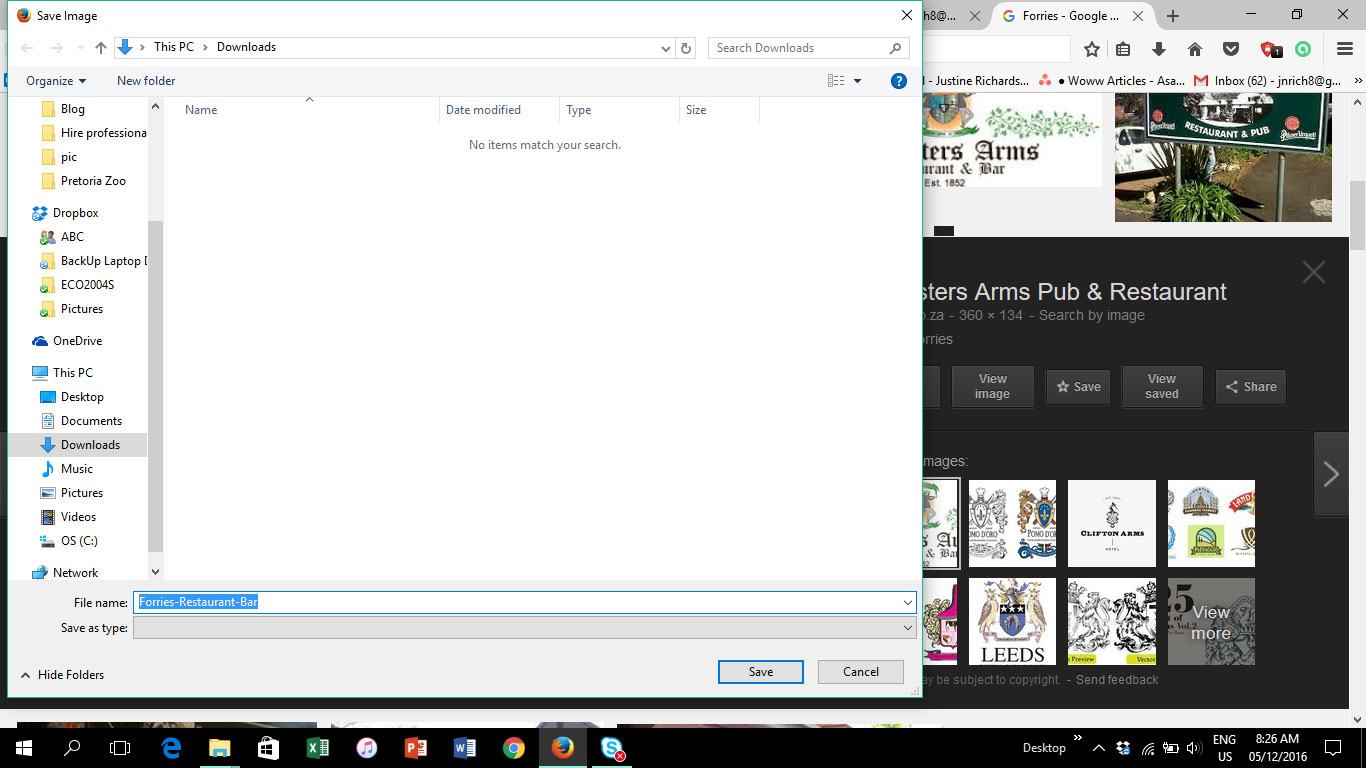
Page Load Speed
Search engines like Bing and Google take the page loading speed into consideration when searching for websites. People don’t like waiting and you want your website to load as fast as possible.
You can speed up your page loading time by optimizing your images (making them small but not too small) and reducing the number of plugins. Uploading a 4MB RAW JPEG file could take minutes to load depending on the user’s internet connection.
See: Website Page Load Speed & How it Affects Your Site
Different Multimedia
By having more and varied media on your webpage, search engines recognise that your content has more value and is of better quality. It will also encourage viewers to stay on your page for longer which in turn boosts your ranking.
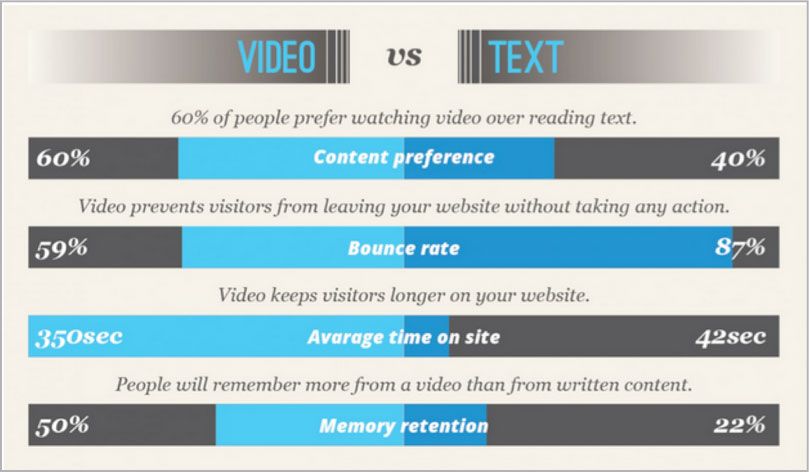
Off-site SEO
Offsite SEO include factors such as backlinks and social media. These are not directly from your website, but still help influence your search engine ranking.
Backlinks
Getting other sites, especially authoritative sites, to refer and link to you improves your search engine ranking. It also increases traffic to your site via these links. If you have good quality, unique content it encourages these good or authoritative sites to link to you.
Quality Backlinks are one of the more significant ranking factors.
Social Media & Blogging
This is gaining website traffic through social media marketing. You need to create your own page where you can connect with friends, share relevant content (to generate traffic) and actively participate.
Here you should start a blog for your website which includes lots of unique content. You can then submit it to various blog directories and search engines. This will also help you gain credibility with search engines.
Webmaster Tools & Site Indexing
Google will find your website eventually (unless you told it not to, which is often a mistake by novices who leave this setting turned on accidently).
But why wait for it to find your site, when you can tell it straight away. Most search engines offer a Webmaster Admin Panel where you can submit a sitemap (a literal map listing all your sites pages and links). This expedites the indexing process and keeps Google up to date with any changes your site makes.
Why do I need SEO for my website?
The bottom line?
The primary goal of a website is to increase traffic for your website at the lowest possible cost. Through SEO you can increase your website’s ranking and likelihood of being found through organic searches without having to pay for adverts. Good SEO increases exposure, profit, and credibility.
Increased Exposure
Good SEO also allows for your website to come up on Google when someone inputs a search for something relevant to your website. When you have successful SEO, there will be a wider variety of searches which bring up your website. This is great for you, as more people on your website means a greater chance of achieving your website goals.
Increased Profits
Further, if your website is serving as your online platform for your business, successful SEO serves as invaluable and free advertising. You are increasing your revenue without increasing costs. Therefore you are growing your profits exponentially.
Helps Build Credibility for More Views
By having a high ranking, good backlinks, and good quality content, you are building trust and credibility with your viewers. They are more likely to view and follow your website.
Conclusion
At Woww, we believe that SEO is critical for a successful website, regardless of the purpose. We offer this service free of charge when we design your website. We know all the tricks of the trade and follow all the best practices to ensure your site will reach its maximum potential.


